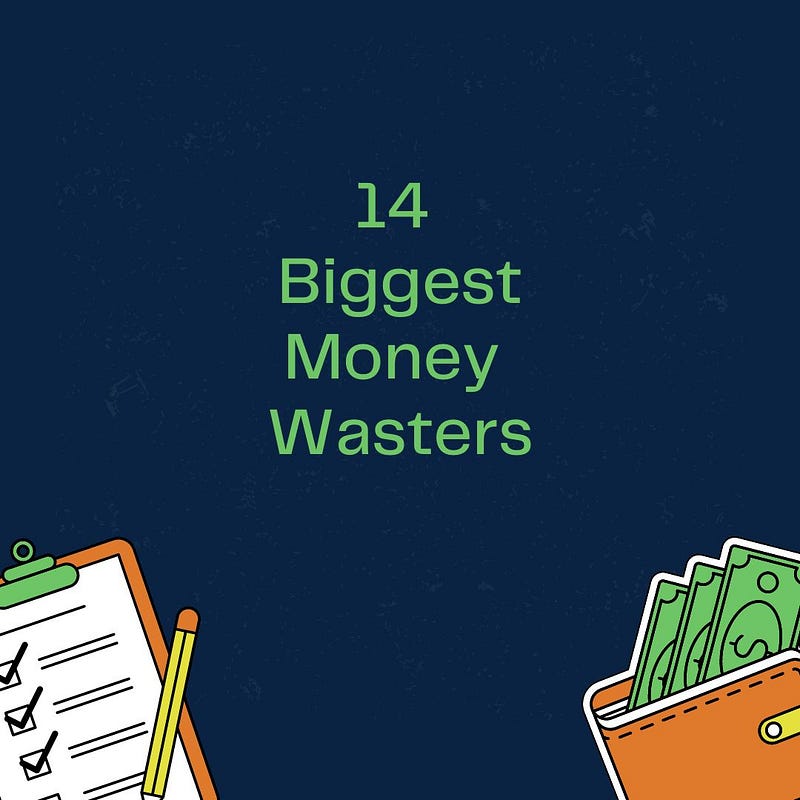Avoid These Common Money Drainers to Boost Your Savings
Written on
Chapter 1: Identifying Common Financial Pitfalls
Have you ever found yourself pondering, "Where has all my money gone?" It's a common dilemma many of us face, especially when our expenses seem to outstrip our income. Certain expenditures can wreak havoc on our budgets, but fortunately, many of these can be minimized or completely avoided. So, what are these sneaky money drains?
Section 1.1: Everyday Expenses to Cut

- Gambling: This pastime can easily disrupt your financial stability, especially during major sporting events. Remember, there's no guaranteed win.
- Lottery Tickets: While they may seem affordable, the costs can accumulate significantly over time, with incredibly slim chances of winning.
- Cigarettes and Vaping: Not only are these habits harmful to your health, but the money spent could be better allocated elsewhere.
- Alcohol: While occasional consumption is generally harmless, making it a daily habit can take a toll on both health and finances.
- Pre-made Drinks: These often come with unnecessary calories and costs. Opt for homemade beverages instead for better control over both.
- Store-bought Snacks: Generally, preparing your own snacks is cheaper and provides more value for your money.
- Convenience Store Purchases: Items at these stores typically come with a premium price tag. Choose grocery or discount stores for better deals.
- Dining Out: Eating at restaurants often includes paying for the service on top of food costs. Home-cooked meals are a far more economical choice.
- Movie Theater Snacks: The prices for snacks at theaters can be exorbitant. It's wise to eat beforehand or bring your own treats.
- Paper Towels: Instead of relying on disposable products, consider using cloth rags or old clothing, which can be reused.
- Cable TV: With rising costs, consider alternatives like Roku or streaming services that offer more affordable viewing options.
- Impulse Purchases: Many people, including myself in my younger years, have resorted to shopping sprees during low times to feel better temporarily.
- Unused Items: We often buy things on a whim, only for them to collect dust. Always evaluate whether an item will be genuinely useful.
- Trying to Impress Others: Often, we spend money on things to gain approval from people we don’t even like. Embracing authenticity can save money in the long run.

Section 1.2: Strategies for Financial Health
These financial pitfalls can quickly drain your wallet and disrupt your budget. Personally, I've fallen into some of these traps in the past. The key is to recognize and reduce or eliminate these expenditures from your life. The funds saved can be redirected towards emergency funds, paying off debt, or investing, ultimately leading to a more secure financial future.
Watch this video on 14 Sneaky Money Wasters to Be on the Look Out For to learn more about avoiding unnecessary expenses.
Chapter 2: The Cost of Poor Spending Habits
In this video, discover 14 Things POOR People Waste Their MONEY On! Hear insights from Warren Buffett on frugal living.
Conclusion
By addressing these common financial pitfalls, you can prevent the all-too-frequent question, "Where did my money go?" Steering clear of these traps not only alleviates financial stress but also promotes a more stable financial future. Let's work towards breaking the cycle of living paycheck to paycheck, making life a little less stressful.

If you have any questions or suggestions, please leave them in the comment section. Thank you for reading, and have a wonderful day!